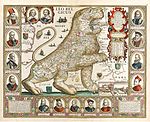Our website is made possible by displaying online advertisements to our visitors.
Please consider supporting us by disabling your ad blocker.
History of Belgium
| History of Belgium |
|---|
 |
|
Timeline • Military • Jewish history • LGBT |
| Part of a series on the |
| Culture of Belgium |
|---|
 |
| History |
| People |
| Languages |
| Mythology and folklore |
| Cuisine |
| Religion |
| Art |
| Music |
| Sport |
For most of its history, what is now Belgium was either a part of a larger territory, such as the Carolingian Empire, or divided into a number of smaller states, prominent among them being the Duchy of Lower Lorraine, the Duchy of Brabant, the County of Flanders, the Prince-Bishopric of Liège, the County of Namur, the County of Hainaut and the County of Luxembourg. Due to its strategic location as a country of contact between different cultures, Belgium has been called the "crossroads of Europe"; for the many armies fighting on its soil, it has also been called the "battlefield of Europe"[1] or the "cockpit of Europe".[2]
Belgium's modern shape can be traced back at least as far as the southern core of the medieval Burgundian Netherlands. The Eighty Years' War (1568–1648) later led to the split between a northern Dutch Republic and the Southern Netherlands from which Belgium and Luxembourg developed. The area, long a Habsburg stronghold, briefly came under Bourbon control during the War of the Spanish Succession. The resulting Peace of Utrecht transferred the area back to Habsburg control, creating what is now known as the Austrian Netherlands. The French Revolutionary wars led to Belgium becoming part of France in 1795. After the defeat of the French in 1814, the Congress of Vienna created two new states, the United Kingdom of the Netherlands and the Grand Duchy of Luxembourg, which were placed in dynastic union under the House of Orange-Nassau. The Southern Netherlands rebelled during the 1830 Belgian Revolution, establishing the modern Belgian state, officially recognized at the London Conference of 1830. The first King of Belgium, Leopold I, assumed the throne in 1831.
The first half of the twentieth century was tumultuous. Its historic neutrality was violated in each of the World Wars. During World War I, frustrated German invaders launched the Rape of Belgium. During the 1940 invasion, the quick surrender by Leopold III of Belgium to German forces drove a wedge between the King and his people. The King's attempt to return led to a constitutional crisis in 1950, which led to his abdication in favor of his son Baudouin. Belgium entered the second half of the twentieth century showing an unprecedented era of economic growth, as Belgium took an active role in the formation of the Benelux customs union with its neighbors. Ultimately, the Benelux union would serve as a model for the European Economic Community, a precursor to the European Union; to this day Brussels serves as the seat of many of the European Union institutions.
Domestically, the country has faced divisions over differences of language and unequal economic development. This ongoing antagonism has caused far-reaching reforms since the 1970s. It is now divided into three regions: Dutch-speaking Flanders in the north, French-speaking Wallonia in the south, and bilingual Brussels in the middle. Since the 1990s, Belgium has become involved in several international conflicts, under the aegis of various United Nations peacekeeping forces, including the Rwandan Civil War, the ongoing civil wars in Somalia, the Kosovo War, and several others. Environmental concerns came to a head in the Dioxin affair, bringing down the Belgian government of Jean-Luc Dehaene's premiership. Since then, the Belgian political landscape has become increasingly politically fragmented; after the 2010 Belgian federal election, it took nearly a year to form a government, and in more recent elections a growing right-wing Flemish nationalist movement has had a strong influence over domestic politics.
- ^ Smith, Thomas Alford (1921). A Geography of Europe. Macmillan. p. 115.
- ^ "Primrose, Archibald Philip, fifth earl of Rosebery and first earl of Midlothian". Oxford dictionary of phrase and fable (2nd ed.). Oxford University Press. 2005. ISBN 978-0-1986-0981-0. Retrieved 21 March 2021.
cockpit of Europe a name for Belgium, as a part of Europe on which European conflicts have frequently been fought; the idea is first recorded in the writings of the Anglo-Welsh man of letters James Howell (c. 1594–1666)
Previous Page Next Page


